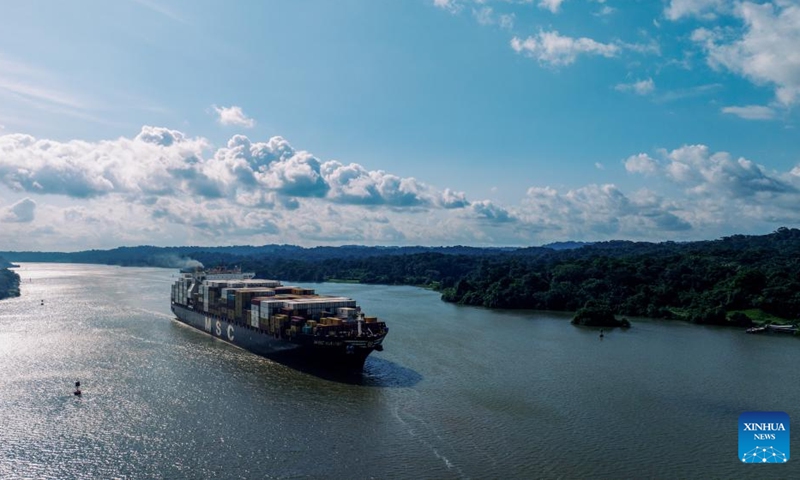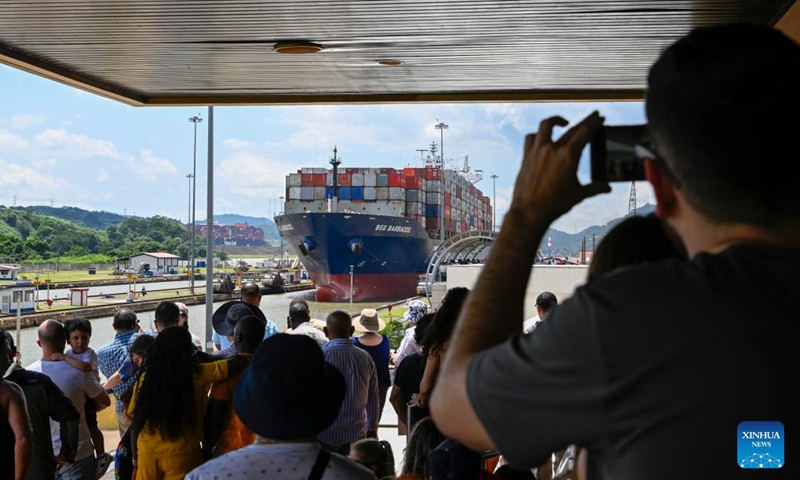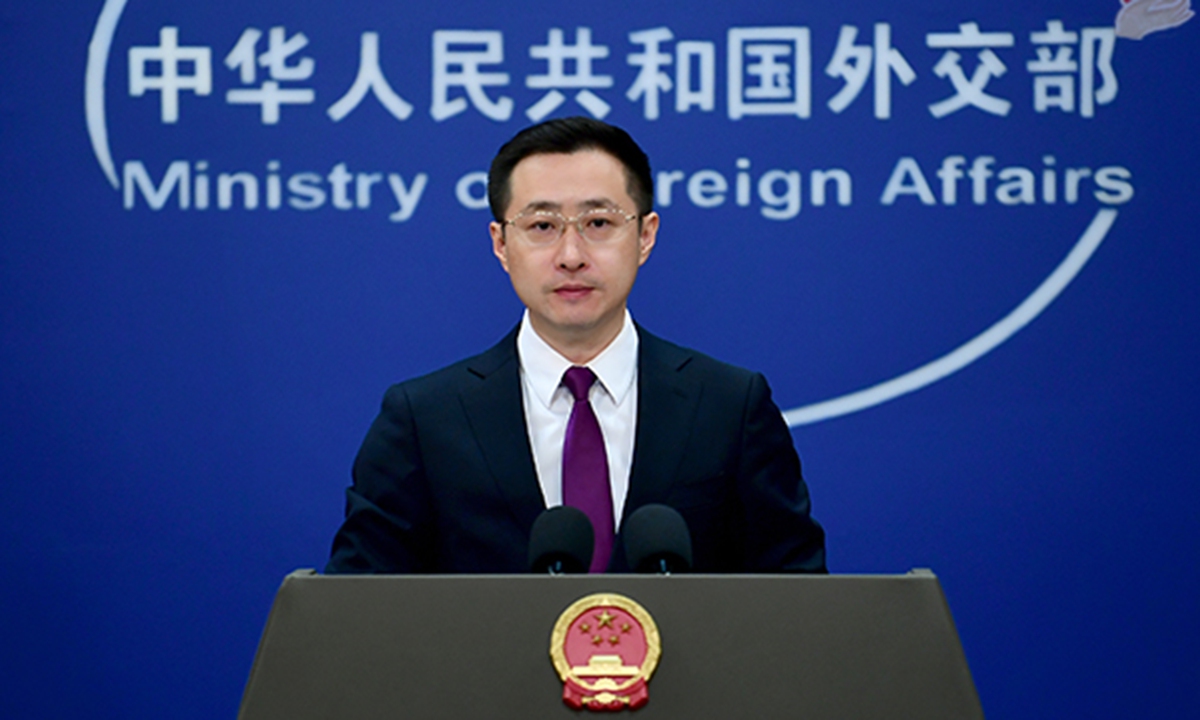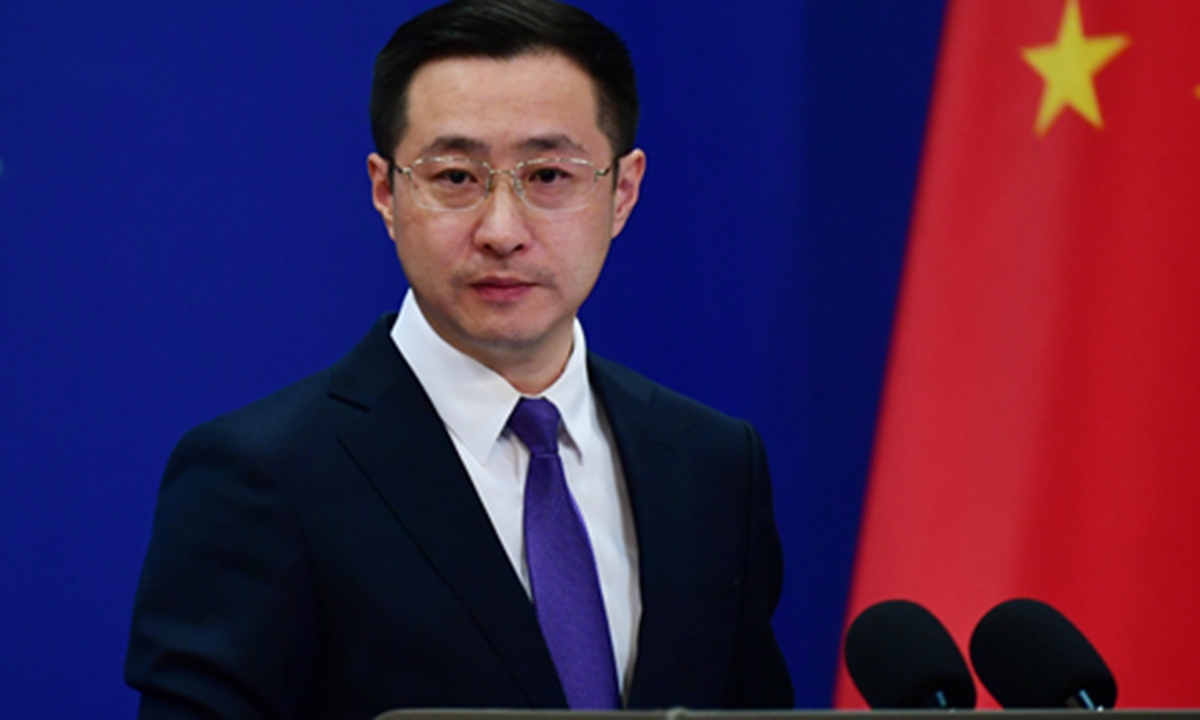China supports Panama’s efforts to maintain sovereignty over Panama Canal, says Chinese FM in response to Trump’s threat to reassert US control over waterway

A drone photo shows a cargo vessel sailing on the Panama Canal near Panama City, Panama, Aug. 28, 2024. The Panama Canal, connecting the Pacific and Atlantic Oceans, spans over 80 kilometers and is one of the world's most important trade waterways. The Panama Canal officially opened on Aug. 15, 1914. This year marks the 110th anniversary of its inauguration. Photo: Xinhua
The Panama Canal is a great creation of the people of Panama, and China has always supported the people of Panama in their just struggle for sovereignty over the Canal, Chinese Foreign Ministry spokesperson Mao Ning said on Monday, when commenting on US President-elect Donald Trump's recent claim that the canal is a "vital national asset" for the US, which he threatened to reassert US control over.Trump's remarks put this key waterway in South America under the spotlight, after he threatened Sunday to reassert US control over the Panama Canal. He accused Panama of charging excessive rates to use the Central American passage and drew a sharp rebuke from Panamanian President Jose Raul Mulino, Reuters reported on Monday.
"As president, I want to express precisely that every square meter of the Panama Canal and its adjacent zone belongs to Panama and will remain so. The sovereignty and independence of our country are not negotiable," Mulino said in response to Trump's claim on Sunday in a video he published on his X account, Anadolu Agency reported.
Trump also accused Panama of charging "exorbitant prices" to American ships, a claim Mulino dismissed. "The rates to use the canal were established publicly and in an open hearing, considering market conditions, international competition, operating costs and the maintenance and modernization needs of the interoceanic route," the Panamanian President said.
Refuting Trump's allegation that China was involved in the canal's management, Mulino said the canal "is not under direct or indirect control, neither by China nor by the European community, by the US or by any other power," saying that such a statement "distorts reality," the report said.
When asked to comment on the issue, Mao said at Monday's press briefing that "We noted Panama's President Jose Raul Mulino has issued an open statement on this. He stressed that every square of the Panama Canal and its adjacent area belong to Panama and the sovereignty and independence of the country are not negotiable. He added that rates are not a whim and the Canal has no control, direct or indirect, from any power."
"The Panama Canal is a great creation of the people of Panama. It is a golden waterway for connectivity among countries. China has always supported the people of Panama in their just struggle for sovereignty over the Canal. Dating back to the 1960s, large-scale demonstrations took place across China, which had been vocal in supporting the people of Panama in their struggle to regain their sovereignty over the area of the Canal. China will as always respect Panama's sovereignty over the Canal and recognize the Canal as a permanently neutral international waterway," Mao said.
"We believe that under the efficient running of Panama, the Canal will continue to make new contributions to facilitating integration and exchanges between people of different countries and enhancing humanity's wellbeing," said the spokesperson.
Wang Youming, director of the Institute of Developing Countries at the China Institute of International Studies in Beijing, said the so-called reclaiming of US control over the canal is unrealistic due to existing treaties and international norms that prevent such actions. "Trump's ultimate goal seems to be negotiating better port fees for American ships with the Panamanian government after taking office; this is just a bargaining tactic," Wang told the Global Times on Monday.
This also reflects the US attitude of viewing Latin America as its backyard, the expert said.
Panama is located at the narrowest point of the Central American isthmus, covering an area of 75,500 square kilometers. The Panama Canal, situated in the central part of the country, serves as a "maritime throat" connecting the Atlantic and Pacific Oceans. Over its 110 years of operation, this "golden waterway" has made significant contributions to global trade while also bearing the scars of humiliation and struggles. It recorded the resistance of the Panamanian people against oppression and witnessed the rebirth of this nation after enduring hardships, according to the Xinhua News Agency.
Panama gained its independence from Spain in 1821 and from Colombia in 1903, though the latter was in essence "a deception" devised by the US - in January 1903, the US signed a treaty with Colombia, stipulating that it would grant the US a 9.7-kilometer-wide strip of land in the isthmus for the construction of a canal. In August of the same year, the Colombian Congress rejected the treaty on the grounds that it compromised national sovereignty. Angered, the US decided to increase its support for Panamanian separatists, facilitating Panama's split from Colombia to become a country more easily controlled by the US, Xinhua reported.
From that point on, the US took over the so-called Canal Zone, starting a long string of unfortunate events for Panama, said Julio Yao, former foreign policy advisor to the late Panamanian leader General Omar Torrijos, recalling the history of nonstop US intervention in Panama since the turn of the 20th century in a recent interview with Xinhua.
In September 1977, the Torrijos-Carter Treaties were signed by Torrijos and then US President Jimmy Carter, establishing that the Panama Canal would be turned over to Panamanian control on Dec. 31, 1999, according to Xinhua.
"In terms of sovereignty issues, the interventions in sovereignty matters can no longer follow the practices of the last century. Gaining respect in Latin America is not a zero-sum game; it should not involve taking something from others. Instead, the approach should be to engage locally, taking into account of local sentiments and safeguarding local development interests. Only by expanding mutual benefits and then sharing the incremental gains can one earn the true recognition and respect of Latin American countries," Pan Deng, director of the Latin American and Caribbean Region Law Center at China University of Political Science and Law, told the Global Times on Monday.



